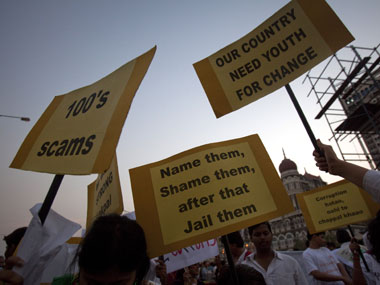One of the most persuasive arguments advanced by the anti-corruption movement led by Team Anna over the past year has been that an agency that is investigating allegations of corruption in the bureaucracy should have independent investigative powers – and be free of government control when it comes to sanctioning prosecution. Without those provisions, an anti-corruption agency remains tied to the apron strings of the government and is rendered toothless. It will be required to seek permission from the very government whose officers it is investigating and wishes to prosecute. And given the convivial boys’ club nature of relationships in the higher bureaucracy, such permission is seldom given. This allows investigations to peter out and for the accused to escape prosecution even when there may exist a watertight case. The point came up for discussion in the recent extended session of Parliament that debated the Lokpal Bill. BJP leader Arun Jaitely made a strong case for giving the CBI functional and administrative autonomy from the government – at least in respect of its investigations against corruption. [caption id=“attachment_172102” align=“alignleft” width=“380” caption=“The demand for a strong and independent anti-corruption agency is validated even further by ‘superbabu’ syndicates and the politician-bureaucrat nexus that allows corruption to thrive without fear of investigation or prosecution. Reuters”]  [/caption] Yet, for all the forceful points made on the need to ensure the functional autonomy of investigating agencies, the concept remains somewhat nebulous: what precisely does “autonomy” mean, and what will it translate to in material terms? Can it be demonstrably proved that in the absence of such independence, investigations actually suffer? A case of recent vintage throws illuminating light on just that subject and underlines the merits of Team Anna’s demand for a truly independent anti-corruption agency. The finance ministry, in its eagerness to defend one of its own babus who faces corruption charges, is itself giving a graphic demonstration of how the absence of administrative autonomy for investigating agencies effectively renders them impotent. The newspaper Mint reports on a case against Anoop Kumar Srivastava, a Central Excise commissioner, where the finance ministry is effectively scuttling efforts by the Central Vigilance Commission to secure the transfer of the official after finding him guilty of weakening a tax-evasion probe against a company. The full story can be read here, but the gist of it is that the anti-tax evasion unit in Srivastava’s department was investigating a case of alleged tax evasion of Rs 40 crore by India Steel. But Srivastava transferred the officers who were investigating the tax evasion charge, and reduced the tax evasion amount to Rs 2 crore, according to a CVC investigation into his actions. Having found Srivastava guilty and “of doubtful integrity”, the CVC asked the chairman of the Central Board of Excise and Customs to transfer him, but although the CBEC board decision endorsing the disciplinary action was forwarded to the finance ministry, the superbabu continues in the same office because the finance ministry has not approved the action. And since the CVC, which has been bleating on about the need for independent investigative powers, has only “advisory” powers, it cannot make its recommendations for prosecution count for anything so long as the neta-superbabu nexus remains unbroken. The Times of India’s Hyderabad resident editor Kingshuk Nag blogs about this chummy ‘superbabu’ syndicate of senior bureaucrats who are together riding the gravy train, and who stand up for one another in a sort of professional compact. Nag narrates the incident of an IAS officer who was “absent without leave” for five years but got away scot-free because the ‘superbabu’ syndicate covered for him. And when he retired last weekend, his syndicate very helpfully closed the file on charges of corruption against him, to ensure that the generous pension on which the superannuated superbabu retires would not be interrupted even for a day. (Do read Nag’s blog post, which also has other rollicking anecdotes to illustrate how a government “for the bureaucrats, of the bureaucrats and by the bureaucrats” works.) It is this nexus that enables both corrupt politicians and no-less-corrupt bureaucrats to continue to milk the state. A truly independent Lokpal agency with investigative powers of the sorts that Team Anna is pressing for would have broken that cord that enables corruption, but the Lokpal Bill that is now stuck in limbo has none of those provisions. It is shameful in the extreme that the well-meaning and very concrete suggestions offered by Team Anna to ensure a truly independent anti-corruption agency were pilloried by politicians of all hues (who have a stake in ensuring that such an agency is never born) and even by others who resorted to scare-mongering that the Lokpal would become a monster. Today, with the politicians in their entirety having diluted the provisions of the Lokpal Bill to utter meaninglessness, the corrupt can breathe easy. But if anything, the demand for a strong and independent anti-corruption agency is validated even further by these ‘superbabu’ syndicates and the politician-bureaucrat nexus that allows corruption to thrive without fear of investigation or prosecution.
The politician-bureaucrat nexus is at the root of corruption in high places. Only an anti-corruption agency that is independent of the government can break it, but that remains a dream.
Advertisement
End of Article
Written by Vembu
Venky Vembu attained his first Fifteen Minutes of Fame in 1984, on the threshold of his career, when paparazzi pictures of him with Maneka Gandhi were splashed in the world media under the mischievous tag ‘International Affairs’. But that’s a story he’s saving up for his memoirs… Over 25 years, Venky worked in The Indian Express, Frontline newsmagazine, Outlook Money and DNA, before joining FirstPost ahead of its launch. Additionally, he has been published, at various times, in, among other publications, The Times of India, Hindustan Times, Outlook, and Outlook Traveller. see more


)
)
)
)
)
)
)
)
)



